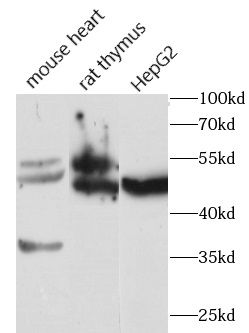Products
FGFR1 antibody
Category:
| Synonyms: | bFGF R 1 antibody, BFGFR antibody, CD331 antibody, CEK antibody, FGFBR antibody, FGFR 1 antibody, FGFR1 antibody, FLG antibody, FLT 2 antibody, FLT2 antibody, Fms like tyrosine kinase 2 antibody, HBGFR antibody, KAL2 antibody, N SAM antibody, OGD antibody, Proto oncogene c Fgr antibody | ||
| Catalogue No.: | FNab10417 | Reactivity: | Human, Mouse, Rat |
| Host: | Rabbit | Tested Application: | ELISA, WB, IHC |
| Clonality: | polyclonal | Isotype: | IgG |
- SPECIFICATIONS
- Product Name
- FGFR1 antibody
- Catalogue No.
- FNab10417
- Size
- 100μg
- Form
- liquid
- Purification
- Immunogen affinity purified
- Purity
- ≥95% as determined by SDS-PAGE
- Clonality
- polyclonal
- Isotype
- IgG
- Storage
- PBS with 0.02% sodium azide and 50% glycerol pH 7.3, -20℃ for 12 months(Avoid repeated freeze / thaw cycles.)
Immunogen
- Immunogen
- fibroblast growth factor receptor 1
- Alternative Names
- bFGF R 1 antibody, BFGFR antibody, CD331 antibody, CEK antibody, FGFBR antibody, FGFR 1 antibody, FGFR1 antibody, FLG antibody, FLT 2 antibody, FLT2 antibody, Fms like tyrosine kinase 2 antibody, HBGFR antibody, KAL2 antibody, N SAM antibody, OGD antibody, Proto oncogene c Fgr antibody
- UniProt ID
- P11362
- Observed MW
- 45-55 kDa
Application
- Tested Applications
- ELISA, WB, IHC
- Recommended dilution
- WB: 1:500 - 1:2000; IHC: 1:50 - 1:200
Validated Images
 Various lysates were subjected to SDS PAGE followed by western blot with FNab10417(FGFR1 antibody) at dilution of 1:1000
Various lysates were subjected to SDS PAGE followed by western blot with FNab10417(FGFR1 antibody) at dilution of 1:1000
 Immunohistochemistry of paraffin-embedded human kidney tissue slide using FNab10417(FGFR1 Antibody) at dilution of 1:50
Immunohistochemistry of paraffin-embedded human kidney tissue slide using FNab10417(FGFR1 Antibody) at dilution of 1:50
- Background
- Fibroblast growth factor receptor 1 (FGFR1) is a tyrosine-protein kinase that acts as cell-surface receptor for fibroblast growth factors. FGFR1 has been implicated in diverse biological processed including embryonic development, cell proliferation, differentiation, migration, and tumorigenesis. Mutations in FGFR1 gene have been associated with Pfeiffer syndrome, Jackson-Weiss syndrome, Antley-Bixler syndrome, osteoglophonic dysplasia, squamous cell lung cancer and autosomal dominant Kallmann syndrome. Alternatively spliced variants which encode different protein isoforms have been described.



